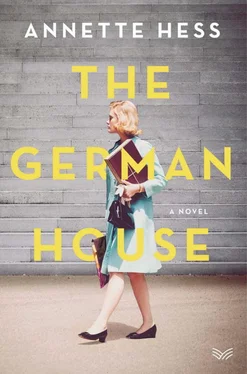Edith smiled at Jürgen.
“And what do you do professionally, Herr Schoooormann?”
“I studied theology. Now I work in my father’s company. In upper management.”
“Mail-order business, isn’t that right? Your family runs a mail-order business?” her father chimed in.
Eva elbowed him. “Daddy! Now don’t pretend to be dumber than you are!”
A short silence, then everyone laughed, including Stefan, although he didn’t understand why. Eva relaxed. She and Jürgen exchanged a glance: It’ll be fine!
“Of course we receive the Schoormann catalog too,” Eva’s mother admitted.
Stefan sang the jingle in falsetto. “Schoormann’s got it, Schoormann gets it—to you. Ding dong! Dong ding!”
Jürgen feigned seriousness. “And have we also ordered from the catalog? That is the question.”
“Of course,” Edith responded solicitously. “A blow-dryer and a raincoat. We were very satisfied. But you should start selling washing machines. I’d rather not go to Hertie’s for such a big purchase. They always talk your ear off. With a catalog, you can consider your options in the comfort of your own home.”
Jürgen nodded in agreement. “Yes, you’re right, Frau Bruhns. I happen to have several changes planned for the company.”
Eva gave him an encouraging look. Jürgen cleared his throat.
“My father is sick. He’ll not be able to run the company much longer.”
“I’m so sorry to hear that,” Eva’s mother said.
“What has he got?” Her father passed Jürgen the gravy boat. Jürgen wasn’t prepared to say any more, though. He dribbled gravy on his meat.
“It tastes delicious.”
“Glad to hear it.”
Eva knew that Jürgen’s father was growing increasingly senile. Jürgen had only spoken about it once. There were good days and bad. But his unpredictability was only getting worse. Eva hadn’t met Jürgen’s father and his second wife, yet. After all, the groom was supposed to visit the parents of the bride first. Eva and Jürgen had argued about whether he should ask for her hand today. Jürgen was against it. Eva’s parents would think him unserious if he stormed in with such a request. Or—even worse—think that there was something else going on. The quarrel went unresolved. Eva studied Jürgen’s face, trying to detect whether he planned to ask her father today. But his expression revealed nothing. She looked at his hands, which clenched the silverware tighter than usual. Eva hadn’t experienced an “intimate encounter,” as Doctor Gorf called it, with Jürgen. She was ready to, considering she’d already lost her virginity two years ago. But Jürgen had clear expectations: no intercourse before marriage. He was conservative. A wife was to submit to her husband’s authority. From the first time they met, Jürgen looked at Eva as though reading her from the inside, as though he knew what was best for her, better than she did herself. Eva, who most of the time didn’t know what she really wanted, had no objection to being led—whether dancing or in life. This marriage would also allow Eva to move up in society. From the innkeeper’s daughter born and raised in Bornheim, to the wife of a distinguished businessman. The thought made Eva dizzy. But it was a happy dizziness.
Right after lunch, Eva and her mother started fixing the coffee together in the spacious kitchen. Annegret had left. She had to work the late shift at the hospital, had to feed her infants. Plus, she didn’t care too much for cake with buttercream icing.
Eva sliced thick pieces of Frankfurt Crown Cake while her mother ground coffee beans in a small electric grinder. Edith Bruhns stared at the growling appliance. When the noise stopped, she said, “He’s not at all your type, Evie. I mean, I can’t help but think of Peter Kraus. He was always your heartthrob….”
“Just because Jürgen’s not blond?”
Eva was shocked by how obviously her mother didn’t like Jürgen. And she considered her mother a great judge of character. Working at the restaurant, Edith had met countless people. At first glance, she could tell whether a person was decent or a lout.
“Those black eyes…”
“Mum, his eyes are dark green! You just need to look more closely.”
“I mean, it’s up to you. His family is certainly above reproach. But I have to be honest, child, I can’t help it. He will not make you happy.”
“Would you just get to know him first?”
Eva’s mother poured bubbling water into the filled coffee strainer. The coffee smelled like the expensive kind.
“He’s too withdrawn, Eva. He’s spooky.”
“He’s thoughtful. Jürgen did want to become a priest….”
“God forbid!”
“He had already studied theology for eight semesters. But then he met me and started rethinking celibacy.”
Eva laughed, but her mother remained stony-faced. “Surely he left school because of his father? Because he needs to take over the company.”
“Yes.” Eva sighed. Her mother was not in the mood to joke. They watched the bubbling water seep through the coffee filter.
Spooky Jürgen and Eva’s father sat in the living room with cognacs. The radio played untiringly. Jürgen smoked a cigarette and studied the ponderous oil painting hung above the cupboard. It depicted a marshy landscape at sunset, the red sky flaring up beyond the dike. Some cows grazed upon a lush meadow. There was a woman hanging laundry beside her cottage. A short distance away, on the right edge of the painting, stood another figure. It appeared out of focus, as if sketched in after the fact. It was unclear whether this was the cowherd, the husband, or a stranger.
Stefan crouched on the rug and prepared his plastic army for battle. Purzel had been let back out of the bedroom, and he lay on his belly and blinked at the soldiers gathered before his nose. Stefan assembled long rows. He also had a tin wind-up tank. It lay waiting in its box.
Meanwhile, Eva’s father was sharing a general outline of the family history with his future son-in-law. “Yep, I’m an old sandworm. Grew up on Juist, as you can probably hear. My parents owned a shop. Supplied the whole island. Coffee, sugar, window glass—we had everything. Actually, Herr Schooormann, just like you. My mother died early. Father never really did recover. He’s been gone for fifteen years now, himself. Edith, my wife, well, I met her at the school of hotel management in Hamburg. That was in ’34, and boy were we wet behind the ears! My wife comes from a family of artists, if you can believe it. Her parents were both musicians in the philharmonic. He played first violin, she played second. It was the other way ’round at home. My wife’s mother, she’s still alive. Lives in Hamburg. My wife was meant to play violin too, only her fingers were too short. So her hope was to become an actress, which her parents nipped firmly in the bud. At the very least, she wanted to see the world, so they sent her to study hotel management.”
“And what brought you here?” Jürgen asked with friendly interest. He’d enjoyed the roast goose. He liked Ludwig Bruhns, who was giving such an enthusiastic account of his family. Eva had inherited her sensuous mouth from her father.
“‘German House’ had belonged to one of my wife’s cousins, and he wanted to sell it. Boy, if that didn’t fit like an ass on the can. Pardon the expression. We seized opportunity and reopened in ’49. We’ve never looked back.”
“Sure, Berger Strasse is worth it….”
“The decent part, I’d like to point out, Herr Schoormann!”
Jürgen smiled reassuringly.
“Anyway, since the episode with my back, my doctor’s been saying I should close up shop! So I spelled out my pension for him. Now we don’t open till five. But there will be an end to this decadent lifestyle, come spring!”
Читать дальше
Конец ознакомительного отрывка
Купить книгу












